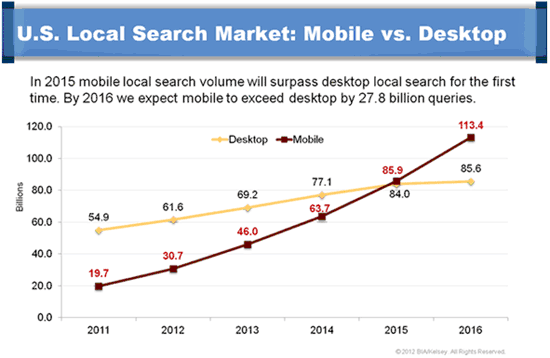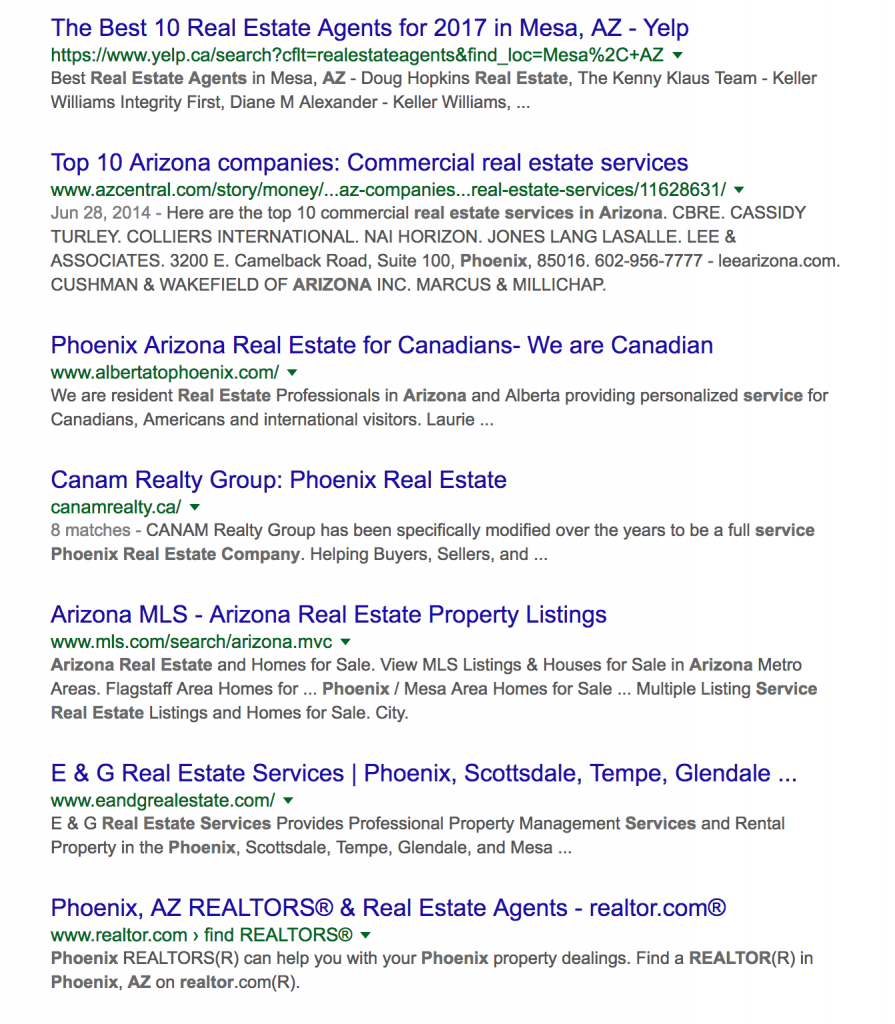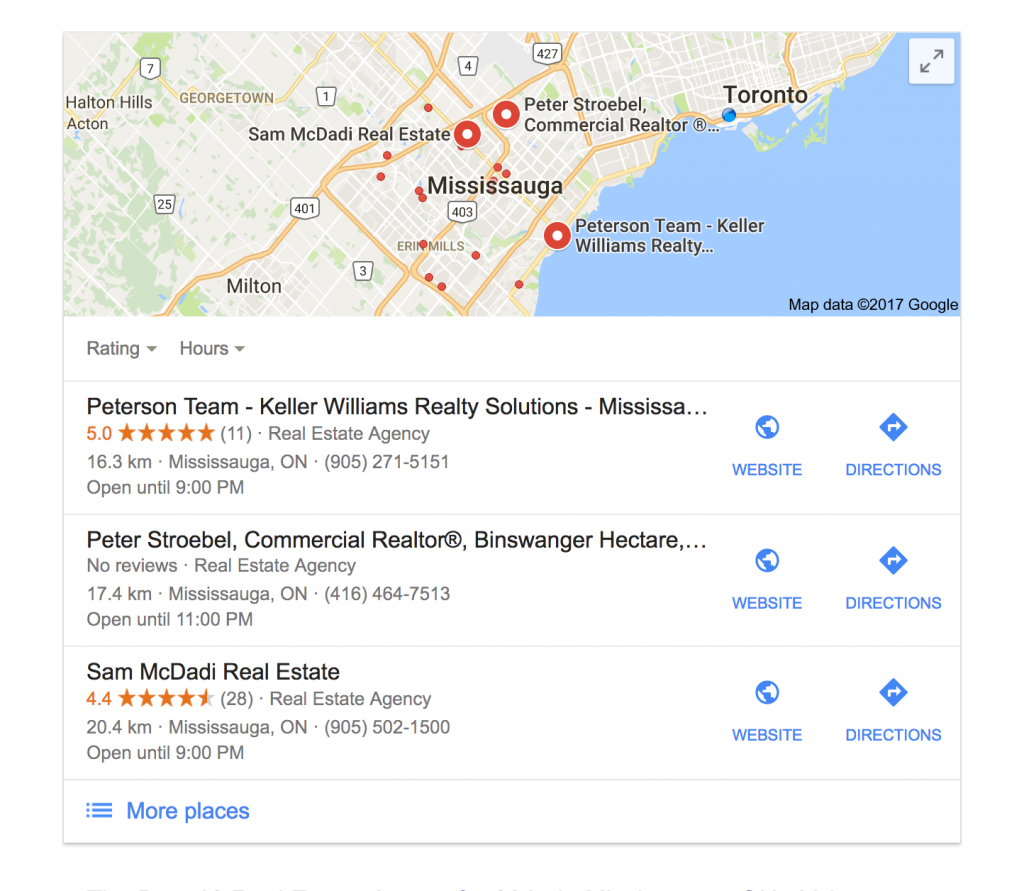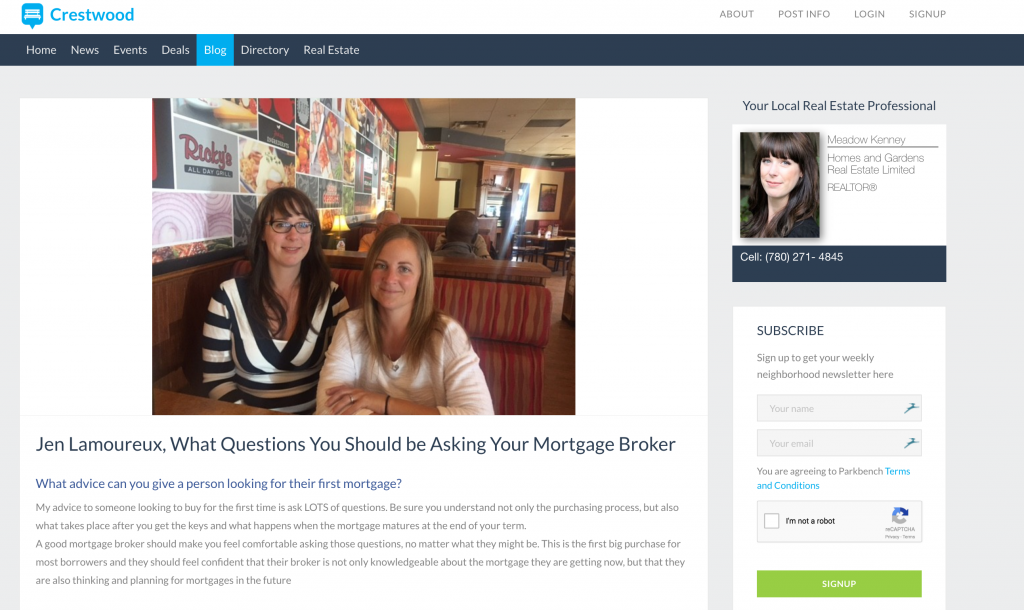Most real estate agents have a hyper-local focus to their business. They’re trying to sell properties in a specific community, neighborhood or city. Trouble is, they have no idea what local SEO is, and why they should be into it.
If you’re an agent who specializes in a specific local region, local SEO can help you improve the visibility of your website in local SERP’s. It sounds complicated, but if you can build a website or manage a WordPress site, heck, if you can pass a real estate agent exam, you’ll get the hang of local SEO with little problems.
To really improve your local SEO, it’s best to get a professional who can audit your website, recommend improvements, and implement a strategy for boosting your local SERP visibility. But if that’s out of your budget, don’t let that stop you.
This article will give you 7 simple local SEO tips you can implement on your own to start gaining momentum in local search results.
What is Local SEO?
Very briefly, anything you do that improves the visibility of your website in local SERP’s is considered local search engine optimization (SEO). Keywords, alt text, tags, metadata, and site architecture are just some of the SEO elements that can be tweaked or manipulated to boost your ranking in search results that are geo-specific.

Explaining Local SERP?
The local search engine results page (SERP for short) is focused on providing users with local business information exclusively (i.e. hotels new york city). A URL link to your website, along with a heading and additional details are gathered from your web page and metadata to produce a quick profile of your business. Your business is displayed in the search results along with a ‘snippet’ describing your business.
How Local Search Engine Results Are Ranked
Results are ranked by the Google Algorithm based on a number of on-page and off-site factors. Geo-proximity is the critical ranking factor used to rank results in local SERP’s. The closer your business is to a prospective user’s physical location, the more visible your ranking in the local search results.
If a potential homebuyer or seller type a search in Google using a location, such as a city or neighborhood (eg: new condos downtown Houston), relevant pages tagged appropriately with the matching keyword will appear in the search results.
If your page content is substantial, it will be more visible because it is of more value to the user. A page with 300 words of text and 1 image, has less information to offer than a page with 1000 words of text, subheadings, and 3 images tagged with ‘alt text’.

This is the reason why listing websites tend to dominate local search results. They have so many pages with relevant content that search engines quickly index these pages for their content. A site like Zillow, for instance, has loads of geo-specific content and keywords, making it much easier for their pages to rank visibly in local SERP’s.
So how is an independent real estate agent supposed to compete with listing giants and larger brokerages that can afford to create far more local content?
Luckily, Google is concerned as well. They don’t want search results dominated by the same players all the time.
You can optimize your website using simple local SEO strategies that will highlight the local content on your website. While other agents are relying on their Zillow listing to generate leads, you can build organic traffic that grows over time, and flows directly to your website instead of a third-party.
Key Benefits of Local SEO
Organic Traffic
Successful local SEO is measured by the volume of organic traffic your website generates. Organic traffic is created through original content that you own and publish. It’s even better than ‘paid traffic’ because you own the content, rather than a third party.
Cost-Effective
Once it’s published, your content remains online, gaining in authority over time as more visitors discover your page. Posts you wrote five years ago – if properly optimized – can continue to drive organic traffic to your site long after your paid ad campaign has stopped running. Re-purposing content and publishing older blog posts can increase your organic traffic by 111%!
Higher Visibility in Local SERP
There are millions of pages of local content on the internet. Users will typically click on the top 3 – 10 results listed on the search results page. The top search result position receives approximately 33% of the total click-through’s – higher than any other position.
In other words, if you’re not on the first page of local search results, don’t expect many click-throughs. Achieving visibility on the first page of local SERP will edge you ahead of competitors and impress potential clients seeking a real estate agent.
Local SEO Tip 1: Get in the Google 3-Pack
Probably the simplest thing you can do to directly improve your visibility in local Google SERP’s is to register your real estate business for visibility in the Google 3-pack.
The Google 3-Pack offers businesses top-tier visibility in the coveted top 3 positions of local search results. Information from your Google My Business profile, Google+ and Google Maps are integrated to create a snapshot of your real estate business to users. Your listing is further enriched with a link to your website, Google Map directions, and your star review rating.

Businesses are listed and ranked based on the physical location of their IP address. So, a real estate agent who owns an IP or physical address that is further away from the user physically, won’t show up in a local SERP.
Since users tend to confine their search to the first page, and the top 3 results command the most attention, working your way into the Google 3-pack should be a top priority.
While you cannot manipulate your IP address, you can raise your ranking profile and edge into the Google 3 pack by registering a Google My Business profile. You’ll need a physical address, so even if you operate from home, include your physical location. If a user discovers you while searching for an agent on their mobile phone, they’ll likely call before coming over anyway.
Once your Google My Business profile is complete, you’re in the runnings! As long as your website is up to date, and properly SEO configured, local residents searching for a real estate agent will find you in the local SERP’s. Even if a larger competitor has more pages, your physical proximity will also be a key ranking factor, which evens the odds a bit for the little guys.
Local SEO Tip 2: Claim Your Real Estate Business Listing In Local Business Directories
Search engines need to verify the authenticity of your business to avoid delivering bogus or manipulative information in their local search results. One of the ways a search engine like Google verifies the authenticity of your business is to check for citations of your business in online directories.
An online directory is a digital phone book. Yelp, Google, Bing, Yahoo!, and Merchant Circle are all examples of online directories that are popular with users. More specifically, there are listing directories for real estate agents, where your information might already be listed.
If you have a website, your business information may already be available in a number of local online directories. Directories scour the internet for businesses to include so that web crawlers will index more of their pages. The problem is, some of the business listings are inaccurate, outdated, or corrupted into spam links.
Google your real estate business name to see if there are any other online citations of you on the internet. Visit the directories where you are listed and claim your listing. It’s easy to do.
3 Major Local Directories Are:
Local SEO Tip 3: Register Your Business in Online Business Directories
Find other online business directories with a hyperlocal focus and include your physical address. Neighborhood websites, where buyers and sellers may be researching their prospective neighborhood, are also a good place to list your real estate business.
Online Directories for Real Estate Agents:
- Better Business Bureau
- Angie’s List
- Merchant Circle
- Whitepages
- Superpages.com
- CitySearch
Local SEO Tip 4: Publish Local Neighbourhood Statistics and Information
If you have an IDX website showcasing your listings, awesome! If you don’t have a real estate blog, start one now. Prospective home buyers and sellers searching for information about a neighborhood want to know the crime rate, schools, median household income, and other statistics.
By publishing informative neighborhood statistics routinely on your blog, you’ll increase the number of relevant pages you have for search engines to index. Since your content will be neighborhood specific, anyone using the appropriate keywords will find your content, especially if they are also within geo-proximity of your location
Local SEO Tip 5: Interview Local Business Owners On Your Blog
What if you could publish your own list of local businesses on your blog? A real estate blog doesn’t have to be dull and static! Interview local business owners in your target market. Showcase a business each week and include their physical address. Brick and mortar businesses are ideal candidates because they will value the additional exposure your blog will generate.
As you publish more and more pages with a local focus, filled with keywords used by local residents, your pages will increasingly be indexed by Google over time. Your ranking in local search results pages will climb as well, as your authority with search engines improves.
You’ll generate organic traffic from prospects who may be early in the buying cycle, but can still be valuable as lead referrals later on. Use marketing automation tools to capture these leads, add them to your CRM so you can cultivate these prospects over time.

Local SEO Tip 6: Real Estate Listing Websites
Although competition for visibility on these sites is high, exposure on the top real estate listing websites is almost guaranteed. In fact, the top 10 real estate listing websites attract almost 50% of all real estate searches. So, at the very least, include your property listings and a link to your website.
Top 5 Local Real Estate Listing Websites: (in no particular order)
Local SEO Tip 6: Optimize Your Images for Local Search
Real estate agents who are using a content management system like WordPress, or an IDX website, can optimize the images of housing properties, interiors, headshots, and other photos as well. Search engines search images as well as text. To find optimum images, the search engine reads the metadata for the image, which is contained in the ‘ALT TEXT’ field of your image.
When you click on the ‘Add Media’ option in WordPress, you select ‘Upload an Image’. The image is rendered on your screen with the alt fields on your right. Fill these fields out using the appropriate keywords.
An image of a luxury home you plan to showcase could include the address, which will further increase page relevance for anyone searching a property by street name, town, or even zip. If the search engine finds keywords matching your content, as well as your image on the page with relevant keywords in the alt text fields, you can edge out local competitors for visibility in local SERP results.
Local SEO Tip 7: Optimize Your Website for Mobile Search
Mobile search has already surpassed desktop searches globally. More than half of consumers searching for an agent or property online will do so from a mobile device. Whether your website is brand new, or you’re thinking of launching a blog, find a publishing and content management platform that is mobile responsive.
The user experience on mobile devices is more restricted than a desktop environment, but the portability and convenience of smartphones have made them ubiquitous in our society. Google and other search engines rank websites that deliver a great mobile experience higher in their local mobile search results. Webpages that take too long to load, flash script that obstructs content on the page, popup ads, and interstitial pages, ruin a user’s experience, driving your bounce rate up swiftly.
Perform a website audit to check for site architecture problems that may be impacting the performance of your pages. Review the features offered by your hosting service to ensure that your website is always operating at peak efficiency.






